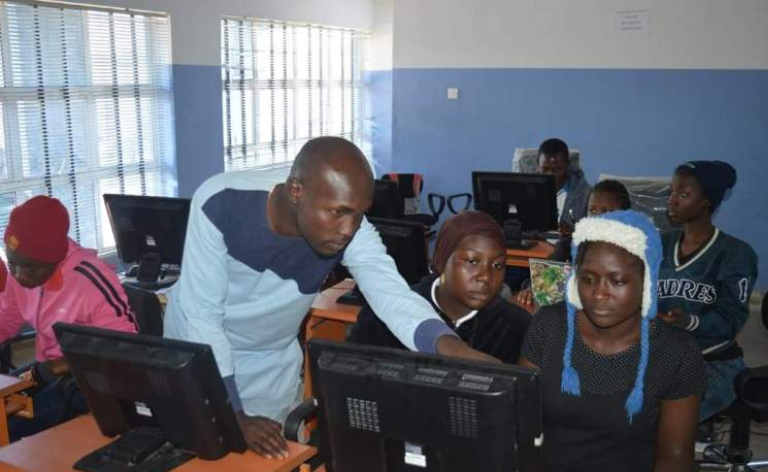Impacting Nigeria: Daniel Ochekwu and the Mentor a Child Initiative (MACI)

The Impacting Nigeria Series continues today with the story of Dan Ochekwu and MACI – Mentor a Child Initiative. Dan and MACI are generally concerned with children and education in the areas of ICT and Technology as well as leadership development. This is especially in light of the key role technology is beginning to play in our world. Read the Story of DAN and MACI below.
Daniel Ochekwu is a pioneer alumnus of Teach for Nigeria, co-founder/Head of Programs at Mentor an African child Initiative and a TeachSDGs ambassador.
In 2017 I joined Teach for Nigeria in the fight to eradicate education inequity in Nigeria and was posted as a Teaching Fellow to St. Annes RCM Nursery and Primary School, Abeokuta Ogun State. In the first week of resumption, I noticed the huge gap that existed in the school where I was posted. These gaps were seen in the area of modern classroom structure, classroom furniture for learners use and comfort, shortage of learning resources for learners and teachers use, a culture set for low achievement etc.
It was quite shocking to see my learners struggle to communicate in the language of instruction (English). I had only 3 pupils out of 43 who could read at the elementary level. It was really discouraging but that was exactly why I took up the role; to change the narrative and create an alternate future for my learners.

While improving learning outcomes in the classroom, I and my partner Micheal Obakhavbaye noticed most learners had not used a computer before. Although they were taught computer as a subject, they had never used one. This was quite disturbing considering the future of the work and the continuous transformations ongoing across the globe. It felt as if, our learners existed three decades ago. For us it was quite an issue because we know 15years from today, our learners will compete for positions with their counterpart from schools with access to this technology and other facilities our learners don’t have access to. This question then was, how would our learners fare? Will they stand a chance? Will they even be bold and confident enough?
So we thought of how best to plug this gap and this led us to start what is today known as Mentor an African Child Initiative (MACI).
A quick survey conducted across underserved schools in Ogun state pointed us in one direction; most schools do not have the facility to train learners to be ICT compliant. The few schools that have do not have trained personnel to facilitate learning. This is the case with most rural/underserved and low tuition schools across Nigeria. The big question then was, how do we get young Nigerians who are from low-income communities to learn and be ready for the rapidly changing job space?
MACI was birthed to create access to ICT and leadership development opportunities for learners from low-income communities attending underserved schools across Nigeria. Currently, MACI operates in South-West Nigeria and runs four programs; Digital Equity Program (DEP), Open School, Tech Support and Beyond the Classroom program.
DEP is focused on creating access to opportunities for learners through training. We organize digital literacy training on a rolling basis for pupils from public primary schools in Ogun state. Over the last 19months, we have been able to train 600+ learners in Ogun state on computer appreciation and programming.
The Open School offers secondary school students the opportunity to link up with tutors across the globe for real-time lessons. They also get the opportunity to link up with peers from other states and countries of the world to share ideas and develop a sense of global citizenship.
The Tech support program trains teachers from underserved schools on how to engage technology in the classroom so as to improve learning outcomes and prepare the learner for the future. Teachers under this program are trained to access information, use tech tools and engage learners with relevant materials. This program was recently added to the list of programs at MACI
The Beyond the Classroom program was designed to develop leadership and the 4Cs among students in secondary schools. This program takes learning out of the classroom, equips the learner with the knowledge for building a sustainable society and tasks them with the responsibility of tackling problems within their community.
I asked Dan some questions and this was how he responded to them:
What is the relevance of ICT and Technology in today’s world?
Technology is today, it is tomorrow and the future we have no idea of.
The relevance is seen, felt and lived in agriculture, medicine, arts, commerce and virtually every field in our world. From the use of drones in agriculture to improve crop production and monitor crop growth, to the use of robots for surgeries with more precision, flexibility and control compared to conventional surgery, to the cashless policy which allows individuals to be more comfortable carrying only a smart card everywhere they go rather than take cash along; technology is changing the way we live and improving our lives. What is even more fascinating is the continuous advancement in the tech space. The future of work obviously is in the tech space. As we all know, the 4th industrial revolution which will be purely driven by tech is around the corner. Tech is the engine of this age.

How does this need and relevance relate to students?
Because of this supremacy of tech. Introducing technology to children at the elementary and foundational stages of education is key. Todays’ learners are tomorrow’s leaders, the very ones who would man the respective workspaces which will be driven by technology. To be productive enough to handle the responsibilities that come with the dynamic jobs, students have to be adequately prepared for the future. Of course, not every student will be directly involved in advancing technology, however, there will need to use the products of technology to advance businesses, in medicine, agriculture, education. To effectively carry out duties in these fields, knowledge of how to use the technology will be required.
At what stage do you think ICT training for kids should begin? Primary or Secondary Schools?
This ICT training should start as early as possible. Parents who have the resources should provide the basic gadgets for learning ICT at home and engage their children with it. As regards the school tier, it should start from primary school. Kids in this century are born smart; they don’t need to be taught how to operate tech products like phones before engaging them. Introducing them to ICT at an early age will only give them enough time to gain mastery before they turn adults. As adults with the requisite skills, it would be easier to solve the problems in our country with the skills developed since they were kids.
What danger does the future of Nigeria stand with the current trends in education?
A lot if you ask me, I worked as a Teach for Nigeria fellow for 2years at an underserved school in Ogun state and I must say this, we need more than a state of emergency in the sector. Nigeria as a country does not know (or do not want to share with the rest of the world) the exact number of out of school children, one statistics puts it at 10.6million, another at 13.2million and our minister said something around 16million. Whichever is correct, it is just too sad. The numbers highlighted above are the size of some countries entire population. It is even more disturbing that we cannot place an exact figure on the children who are in school but not learning. As it stands, the future isn’t bright for Nigeria. We hear of insurgency and kidnapping all over the country, these are the products of a failed education system. Imagine the near future for the learners who are currently enrolled in fantastic schools across the country. The big question here is; what happens when they become properly educated adults living in a multitude of uneducated peers who can take to crime for the smallest of pay just to meet basic needs.
If ICT related education is not introduced, what are the chances of young Nigerians competing in the international scene?
One aspect of this technology education is that very soon, the average Nigerian will not be able to compete in the international labour market. To be honest, we have subjects that should naturally prepare our learners to be tech experts; however, we do not have the right content, structure and skilled personnel to make this happen. While there are many Nigerians in the tech space who qualify as experts, the education space has done little to engage them to groom the next generation or develop the next big app that will solve challenges in the sector.

Nigerians are industrious people, who would naturally identify an area for personal growth and swim against the tide to develop the skill identified. If schools do not teach these skills, people who understand the importance of tech will always find a way to learn. I learnt how to use a computer on my own; read books, watched videos, ask a few questions. Nigerians are typically like that.
Though a lot of great tech minds may be lost to other fields due to lack of access to opportunities to develop tech skills, Nigerians are industrious and will always find a way to compete at the highest level even if the system does not support or make the process easy.
We have read and seen the work of MACI as well as the dangers of the current exclusion of ICT schools from the educational curriculums of our schools especially the public schools. I hope the government and other private stakeholders contribute their quota to abate these issues.
Thank you, Dan and God bless your work.












